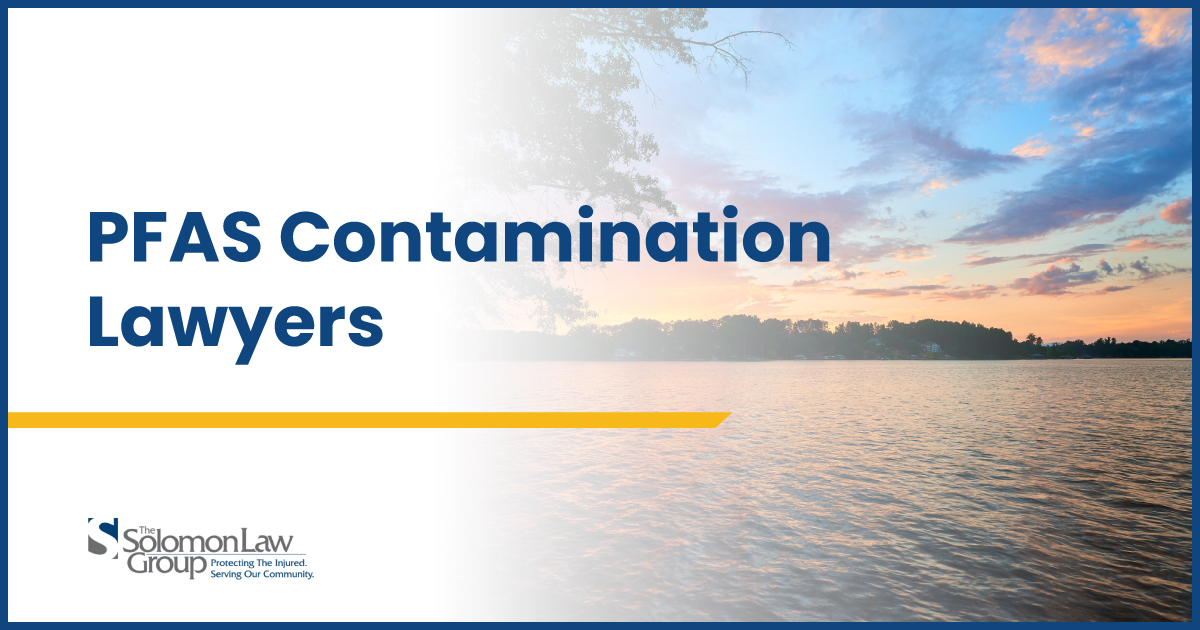PFAS (perfluoroalkyl and polyfluoroalkyl substances) are a group of man-made chemicals that have been used in a wide range of industrial and consumer products for decades. PFAS contamination has become a widespread threat that significantly impacts not only our precious clean water sources but also our own health and well-being, and that of our planet.
If you believe that you’ve been exposed to per- and polyfluoroalkyl substances, you should contact a South Carolina PFAS contamination lawyer immediately and seek treatment from a qualified medical professional.
Health Risks Associated With PFAS Contamination
PFAS are toxic “forever chemicals” commonly found in products such as non-stick cookware, stain-resistant fabrics, and food packaging, and have been associated with a variety of health risks and symptoms when people are exposed to them (primarily through contaminated drinking water, food, and exposure in certain occupational settings).
PFAS health risks can include:
Cancer: The International Agency for Research on Cancer has classified perfluorooctanoic acid (PFOA) and polyfluoroalkyl substance (PFAS) as possible carcinogens in humans based on a 2017 study of subjects who had been heavily exposed to PFAS. Other studies have suggested a potential link between exposure to certain PFAS chemicals and an increased risk of kidney and testicular cancers in particular, as well as non-Hodgkin lymphoma.
Developmental Effects and Reproductive Issues: In utero exposure to PFAS has been associated with developmental effects, including low birth weight, delayed development, and effects on the immune system.
Some research has also suggested a potential link between PFAS exposure and reproductive problems, including reduced fertility and changes in sex hormone levels.
The developing human fetus can be exposed to PFAS via placenta transfer (both active and passive). Newborns might be exposed through breastfeeding or PFAS in their home environment.
Thyroid Disease: PFAS exposure has been linked to thyroid dysfunction, including reduced thyroid hormone levels, which can lead to a range of health issues.
Liver and Kidney Damage: Some PFAS chemicals can accumulate in the liver and may lead to liver damage over time. Prolonged exposure to certain PFAS chemicals may also lead to kidney damage and dysfunction.
Immune System Effects: Exposure to PFAS may weaken the immune system’s ability to fight off infections and illnesses.
Gastrointestinal Issues: People exposed to PFAS-contaminated water may experience gastrointestinal problems, including abdominal pain, diarrhea, and nausea.
Neurological Effects: While research is ongoing, some studies have suggested that PFAS exposure may be associated with neurological effects such as changes in behavior and attention deficit disorder in children.
It’s important to note that the health risks associated with PFAS exposure can vary depending on the specific chemicals involved, the duration and level of exposure, and individual susceptibility.
Some people may experience symptoms and health effects at lower exposure levels, while others may not show immediate symptoms.
I Think I’ve Been Exposed to PFAS—What Should I Do?
If you suspect that you may have been exposed to PFAS or are concerned about potential contamination or PFAS health risks, it’s advisable to consult with a health care professional who can provide guidance on monitoring and managing your health.
Additionally, efforts are ongoing to regulate and mitigate PFAS contamination and to reduce the risks associated with these chemicals, including propositions by the Environmental Protection Agency (EPA) to establish legally enforceable levels for PFAS known to occur in drinking water.
The widespread usage of PFAS chemicals has resulted in their pervasive presence in the environment, including drinking and irrigation water sources
PFAS contamination can also be spread through the improper disposal of products containing these chemicals, industrial production processes, and inadequate wastewater management.
There are several ways that you can be exposed to PFAS. One of the most common routes is through drinking water that has been contaminated with PFAS chemicals. Another pathway is the consumption of food prepared with water that has been contaminated with PFAS.
Additionally, using products that have been treated with PFAS, such as certain types of food packaging, can also contribute to exposure.
Some common examples of possible exposure may include:
- Non-stick cookware
- Stain-resistant fabrics
- Oil-resistant food packaging
- Dirt and stain-repellent cleaning products
- Electronics (to protect against overheating and water intrusion)
- Medical devices such as catheters, tubing, and other non-stick items
In addition to the vast array of consumer products, these chemicals have widely used applications with military, aerospace, and first responders—specifically its use in AFFF firefighting foam which may be a leading cause of water supply contamination globally.
Environmental Impact
The potential environmental risks associated with PFAS contamination are also a cause for concern.
Perfluoroalkyl and polyfluoroalkyl contamination pose significant environmental impacts that can damage ecosystems, wildlife, and natural resources. These impacts stem from the persistent, mobile, and bioaccumulation properties of PFAS in the environment.
One of the primary environmental concerns associated with PFAS is groundwater contamination. PFAS compounds can leach into groundwater from various sources, such as firefighting foam, industrial discharges, and landfills. Once in groundwater, they can persist for extended periods, posing a long-term threat to drinking water supplies and aquatic ecosystems.
Contaminated groundwater can spread over large areas, making cleanup challenging and costly.
PFAS can also find their way into surface water bodies, including rivers, lakes, and oceans, through runoff, industrial discharges, and sewage treatment plant effluents.
This contamination can harm aquatic life and disrupt aquatic ecosystems. PFAS have been detected in fish and other aquatic organisms, potentially leading to bioaccumulation and biomagnification of these chemicals in the food chain.
Adverse effects on wildlife are not uncommon. Birds, mammals, and aquatic species exposed to PFAS may experience health issues, altered behavior, and reproductive problems. Bioaccumulation in predators at the top of the food chain can lead to higher concentrations of PFAS in these species.
This means that as PFAS move through the food chain, their concentrations can increase significantly.
This can result in top predators, such as birds of prey and marine mammals, having high levels of PFAS in their bodies, which can have cascading effects on the ecosystem and disrupt natural habitats.
Aquatic ecosystems, in particular, may face imbalances as certain species are affected, potentially leading to shifts in the composition of species and ecosystem functionality.
One of the most significant challenges in addressing PFAS contamination is the difficulty in remediation.
PFAS are known for their persistence and resistance to degradation, making it challenging to remove them from the environment once they are released. Traditional remediation methods may not be effective, and alternative techniques are still being developed.
This means that contamination can have far-reaching environmental impacts, affecting groundwater, surface water, soil, wildlife, and entire ecosystems. The persistence and mobility of PFAS in the environment, coupled with their bioaccumulative properties, make them a particularly challenging and concerning group of chemicals from an environmental perspective.
Efforts are underway to better understand, regulate, and mitigate PFAS contamination to protect ecosystems and the health of both wildlife and human populations.
Addressing PFAS Contamination
One of the primary methods to remove PFAS from water sources is through filtration.
Various water filtration methods, such as granular activated carbon, membrane separation, ion exchange, and powdered activated carbon, can be effective at removing PFAS.
However, it is important to note that complete removal is challenging due to the persistence and low filtration efficiency of PFAS.
In addition to filtration, mindfulness when choosing products, opting for PFAS-free alternatives whenever possible, and advocating for stricter regulations on the usage and disposal of PFAS chemicals can all help to minimize exposure.
Legal Action for PFAS Exposure
If you, or someone you know, have been exposed to PFAS and have experienced illness, injury, or significant health conditions as a result, you may have legal options available.
In such cases, filing a lawsuit against the responsible party is a possibility.
Class action lawsuits are common in situations where many individuals have been affected by PFAS contamination. To navigate the legal complexities associated with PFAS exposure, it is essential to consult with a South Carolina PFAS contamination and chemical exposure lawyer.
These professionals can assist in gathering evidence, assessing damages, and filing a lawsuit to seek compensation for the harm caused.
South Carolina PFAS Contamination Lawyers
A South Carolina PFAS contamination attorney offers a deep understanding of environmental law and constantly changing regulations, particularly those related to hazardous substances and contamination.
They’re also well-versed in federal and state laws governing PFAS and related chemicals.
Your lawyer will assess the specifics of your situation, including:
- The source of PFAS contamination
- The extent of the contamination
- Any harm or damages you have suffered as a result of contamination, as well as any that may result in the future
This will help determine the strength of your case and the potential legal avenues available to you.
A South Carolina PFAS Contamination attorney can also explain your legal options and help you decide on the best course of action. This may involve pursuing litigation against responsible parties (either as an individual or as part of a class action effort), negotiating settlements, or seeking regulatory action.
If you decide to pursue legal action, your lawyer will conduct a thorough investigation. Common steps of these investigations include:
- Gathering evidence to support your case
- Obtaining medical, financial, and legal documents
- Interviewing witnesses
- Consulting experts in environmental science and toxicology related to your case
PFAS contamination cases often involve multiple parties, including manufacturers, industrial facilities, and even government entities.
Your attorney will work to identify all potentially responsible parties and hold them accountable for the contamination and its effects. They may also assist in dealing with regulatory agencies, such as the Environmental Protection Agency (EPA) or state environmental agencies.
Your lawyer will engage in negotiations with responsible parties or their insurers to seek compensation for damages and cleanup costs and work to secure a fair settlement on your behalf.
If a fair settlement can’t be reached through negotiations, your lawyer will represent you in court, filing lawsuits, presenting evidence, and arguing your case before a judge and jury if necessary.
If multiple individuals or communities are affected by PFAS contamination, your lawyer may help organize or join class-action lawsuits to pursue justice collectively.
The Solomon Law Group specializes in environmental law and has experience in handling PFAS contamination cases.
We can help you understand your rights, explore your legal options, and guide you through the legal process to seek compensation for damages, remediation, and the protection of your health and property in the face of PFAS contamination or chemical exposure.
Perfluoroalkyl and polyfluoroalkyl contamination poses significant risks to both human health and the environment.
It’s imperative to take action to mitigate the impact of PFAS contamination on our personal health, the health of our families, and to ensure a safer future for all.
If you’re concerned about PFAS contamination, chemical exposure, or its effects on your health and well-being, contact us today to learn more about your rights.












